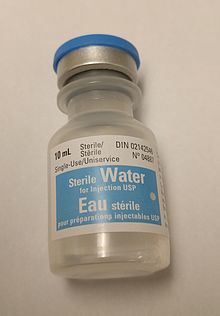Water for injection is water of extra high quality without significant contamination.[1] A sterile version is used for making solutions that will be given by injection.[2] Before such use other substances generally must be added to make the solution isotonic.[3] Isotonic solutions containing water for injection can be given by injection into a vein, muscle, or under the skin.[4] A non-sterile version may be used in manufacturing with sterilization occurring later in the production process.[5]
 Sterile water for injection | |
| Clinical data | |
|---|---|
| AHFS/Drugs.com | FDA Professional Drug Information |
| License data | |
| ATC code | |
| Identifiers | |
| CAS Number | |
| ChemSpider | |
| UNII | |
| Chemical and physical data | |
| Formula | H2O |
Side effects and mechanisms
editThe primary use of sterile water for injection is as an ingredient for dilution of other medications (aseptic preparation of parenteral solutions).[6] If it is given by injection into a vein without making it approximately isotonic, breakdown of red blood cells may occur.[3] This can then result in kidney problems.[3] Excessive amount may also result in fluid overload.[4] Water for injection is generally made by distillation or reverse osmosis.[5] It should contain less than a mg of elements other than water per 100 ml.[5] Versions with agents that stop bacterial growth are also available.[5]
In the UK, some hospitals offer subcutaneous injections of water directly for treating back pain in labour. It is controversial, with some claiming it is pseudoscience.[7] Because sterile water is not isotonic, its injection causes acute pain.[8] One purported mechanism of action is to induce acute local pain to compete directly with diffuse back pain through a mechanism called diffuse noxious inhibitory control; another hypothesis is instead that the acute pain releases endorphins.[8] A review and meta-analysis in 2009 found the benefits of its use inconclusive.[8]
History and culture
editIt is on the World Health Organization's List of Essential Medicines.[9] Water for injection is available over the counter in the United States.[3]
Other names
editWater for injection is also known as aqua ad iniectabilia or aqua ad injectionem.
References
edit- ^ "<1231> Water for Pharmaceutical Purposes" (PDF). hmc.usp.org. p. 2. Archived from the original (PDF) on 11 March 2015. Retrieved 14 January 2017.
- ^ World Health Organization (2009). Stuart MC, Kouimtzi M, Hill SR (eds.). WHO Model Formulary 2008. World Health Organization. p. 493. hdl:10665/44053. ISBN 9789241547659.
- ^ a b c d "Sterile Water for Injection - FDA prescribing information, side effects and uses". Drugs.com. Archived from the original on 18 January 2017. Retrieved 14 January 2017.
- ^ a b "Water for Injection - FDA prescribing information, side effects and uses". Drugs.com. Archived from the original on 16 July 2017. Retrieved 14 January 2017.
- ^ a b c d Ghosh TK, Jasti BR (2004). Theory and Practice of Contemporary Pharmaceutics. CRC Press. p. 396. ISBN 9780203644478. Archived from the original on 16 January 2017.
- ^ "Sterile Water for Injection, USP" (PDF). Baxter Corporation. U.S. Food and Drug Administration. September 2014.
- ^ Lintern S (27 November 2022). "Water jabs and burning herbs offered during natural births at NHS hospitals". The Times. ISSN 0140-0460. Retrieved 30 September 2023.
- ^ a b c Hutton EK, Kasperink M, Rutten M, Reitsma A, Wainman B (August 2009). "Sterile water injection for labour pain: a systematic review and meta-analysis of randomised controlled trials". BJOG. 116 (9): 1158–1166. doi:10.1111/j.1471-0528.2009.02221.x. PMID 19459860. S2CID 19914146.
- ^ World Health Organization (2023). The selection and use of essential medicines 2023: web annex A: World Health Organization model list of essential medicines: 23rd list (2023). Geneva: World Health Organization. hdl:10665/371090. WHO/MHP/HPS/EML/2023.02.
External links
edit- "Water for Pharmaceutical Use". Inspection Technical Guides. U.S. Food and Drug Administration. 27 August 2014.
- "Guideline on the quality of water for pharmaceutical use (draft)" (PDF). 4 Committee for Medicinal Products for Human Use (CHMP). European Medicines Agency (EMA). 13 November 2018.
- "Water for injection". Drug Information Portal. U.S. National Library of Medicine. 16 December 2022.